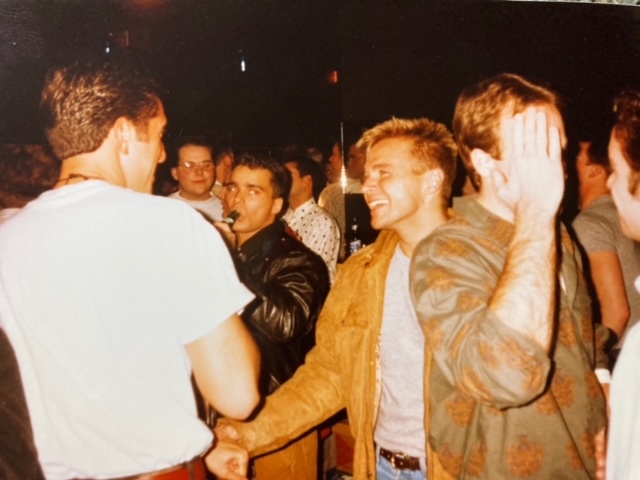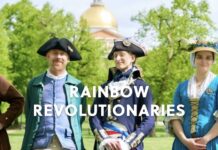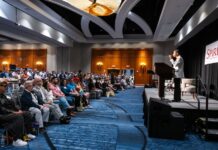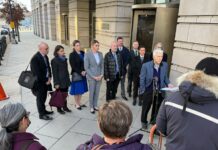[This column appears in the May/June 2022 issue of Boston Spirit magazine. Subscribe for free today.]
Social media users may have noticed a new Facebook group that is catching the attention of those in the 50-plus bracket of gay men. The group is an alumni page for all who once frequented Chaps, a popular Boston gay bar in Copley Square that was a landmark of ’80s and ’90s nightlife.
The page’s description reads in part “This group is [for] all of us who used to gather at this wonderful place. It first was a beer and wine bar with peanut shells on the floor, then eventually it grew and it was the most fantastic club in the city.”
When I came across the Facebook group, I found myself suddenly transported back to that magical time in Boston when every night of the week meant a different bar, and at the heart of it all was Chaps, especially their legendary Sunday Tea Dance. I went to Chaps often during my college years from ’84 to ’88. Two aspects of the Facebook group really stood out to me—the before and after photos that members post to show how they looked in the ’80s and early ’90s when they frequented the club, alongside their photos today, 30-plus years later. The other feature that really brought back a deeper sensory experience are the links to the music of that era. Before I knew what had happened, hours had slipped by as I was reliving those days and feeling the beat of the club scene.
Caught up in the wave of nostalgia after finding this group, I reached out to a friend and made plans for a good old fashion “boys’ night out at the bars.” It has been a while, not just because of the pandemic but perhaps due to different priorities as I got older. But that night we were on a mission to relive some of those memories. Well, things have changed. I knew our choices were limited, from 20-plus bars back in the day to maybe three today. Within a short time, we both knew that what we were looking for was long gone.
The other reason this issue is important to me is due to my role at Fenway’s LGBTQIA+ Aging Project. I am frequently involved in intergenerational events and panels, and I am always focused on the aspects of our culture and history that are being passed down to the younger generations. Did we do something to let this vibrant gay nightlife slip through our hands? To explore this question, I decided to turn return to Chaps in a new way, through the Facebook group to hear from some of the men who are now regulars in this “virtual bar scene.”
‘Virtual’ regulars
“Finding this group was like going back to Chaps times 10,” said James Holske, 52, from Boston. “All the memories came flooding back. This was the perfect definition of family because you can be separated from family for any amount of time, but when you find each other again, you pick right up from where you left off.” Chris Smith, 59, of Marblehead, said, “Finding this web page was so wonderful because of the joys of reconnecting with people I had lost touch with, but it also brought waves of sadness when I realized the number of people we lost to AIDS.”
Mark LaFrance, 64, a Boston resident for 35 years, now in Portland Maine, first went to Chaps in 1983 when he was 23. “I thought that time in my life was nothing but a memory, but finding the Chaps Facebook group brought it all back. Suddenly I was reconnecting with people I knew back then. We have this shared sense of history through this bar at a particular time in our lives. What surprised me is that this page rekindled a sense of community, I could connect with all these people I once knew, even though I don’t live in Boston anymore because Chaps lives on again—online.”
Jason Hayes, 51, of East Granby, Conn., had a colorful history with Chaps. “I won the first-ever Miss Gay Chaps Queen of Hearts Pageant thrown by the amazing Bobby Costello. I was also then hired to go-go dance and shower with the boys at Sunday Tea Dance and pass out appetizers in drag.” When Hayes found the Chaps Facebook group, he added, “I have had my heart filled with joy and then broken hearing of more losses all in the same day. It has sent me down memory road and had me digging for old photos to post on the page. The music people post is my greatest joy to listen to and close my eyes and just feel the dance floor come alive in my mind again. I have reconnected with a dozen friends I haven’t seen in almost 30 years as well as two exes.
Some of my own concerns about the lack of a bar scene in Boston had to do with the role these clubs had in the development of our identities as gay men. Many of us learned what it meant to be gay through friends, mentors and lovers at the clubs. For Marc Davino, 56, of Boston, it was his first-ever gay bar. “It was 1991, and I had just moved to Boston the year before. I didn’t know anyone, and I wasn’t out. I was so eager to meet people, but I had no idea what to expect. I actually thought everyone would be wearing leather hats and leather vests, since that was the stereotype then of gay men.” Davino was so happy to find other men like himself, and he quickly developed friendships that became the core of his new social life in Boston.
Besides the music and friendships, the clubs also provided another critical role for many of these gay men—a place of safety where they could finally be themselves. A popular feature of the gay bar scene in Boston in the ’80s and ’90s was the 18-plus nights that allowed people 18 and up to enter gay bars, allowing them to be a part of the scene even though they could not drink. This was a time when many generations were all together in the same venues.
“When I was a teenager, I was hunted down in my hometown of Mansfield for being gay,” Holske said. “So I would sneak into Boston and try to get into the gay bars. I first went to Haymarket, and it scared the hell out of me, and I turned around and ran out. Then I tried Chaps and it felt like home. I will never forget sitting down at the bar and ordering a beer from the bartender Bobby Daigel. I am sure he knew I was underage, but he gave me a wink and handed me a Budweiser. Over the years, he became a mentor to me; that was something I lacked back home. He helped me find my place in the gay community. He would educate me when I was doing something stupid. One time, he got really mad at me when I shunned some older gay men at Chaps. He said, ‘You have to make friends with everybody. The older guys will always be there for you, don’t you ever turn your back on them, they made this community.’”
Changing times
I also put all these men to the question of what happened here in Boston? Why did so much of this vibrant night life shutter and close down? Some suggested that it’s a young city with all the colleges, and today gay people can be themselves in any club, so going to a place that is fun is more important than someplace that is all gay. Holske, like many of the people I spoke with, worked in these clubs in the years when things were declining, and they had a different take on the issue. “The problem started with ecstasy because people stopped ordering drinks and the bars were struggling to stay open. We added cover charges at the door and raised the cost of bottled water because that’s all people were drinking. Then everything went downhill fast once many in the gay community got mixed up with crystal meth.”
Just about everyone pointed out the final nails in the coffin were cell phones and hook-up sites like Manhunt and Grindr. Why bother spending all that time and effort getting ready to go out and forking over cash for the cover and drinks when you could order in with Grindr?
Many of the Chaps alumni had a harsh take on the dwindling bar scene now. They see crowds more focused on their phones than each other. “Back in the day, before cell phones, you actually talked to people in bars, and every night you went out you met new people,” Smith added. “Chaps back then was so much fun. If you were single, then each night you were there you never knew if you were going to just have fun with your friends or meet someone you ended up dating. There were no cell phones back then, so you actually had to go up and talk to someone.”
What does Smith miss most in the absence of the bar scene? “The excitement of going out and having fun with your friends and maybe you’d meet the love of your life,” he said. “If you saw someone you liked, you walked up to them and talked to them…or got rejected—ha-ha. I miss that so much.”
In the end, should we feel like we failed the younger queer generation by letting the gay bar scene slip away, or do we realize that perhaps we paved the way for them to go out with pride as their authentic selves to any venue or bar they want?
We still have options. You can reconnect with your former bar days through online Facebook groups like Chaps, or you can go out and create new memories by supporting the remaining gay bars in Boston and across New England.
Maybe it’s time to update the 18-plus nights to 50-plus nights!
[Next time: Hear from the lesbian community about their “bar times.”]
Bob Linscott is assistant director of the LGBTQIA+ Aging Project at The Fenway Institute. If you have comments or ideas about Senior Spirit, please write to BLinscott@fenwayhealth.org.
Not a subscriber? Sign up today for a free subscription to Boston Spirit magazine, New England’s premier LGBT magazine. We will send you a copy of Boston Spirit 6 times per year and we never sell/rent our subscriber information. Click HERE to sign up!









